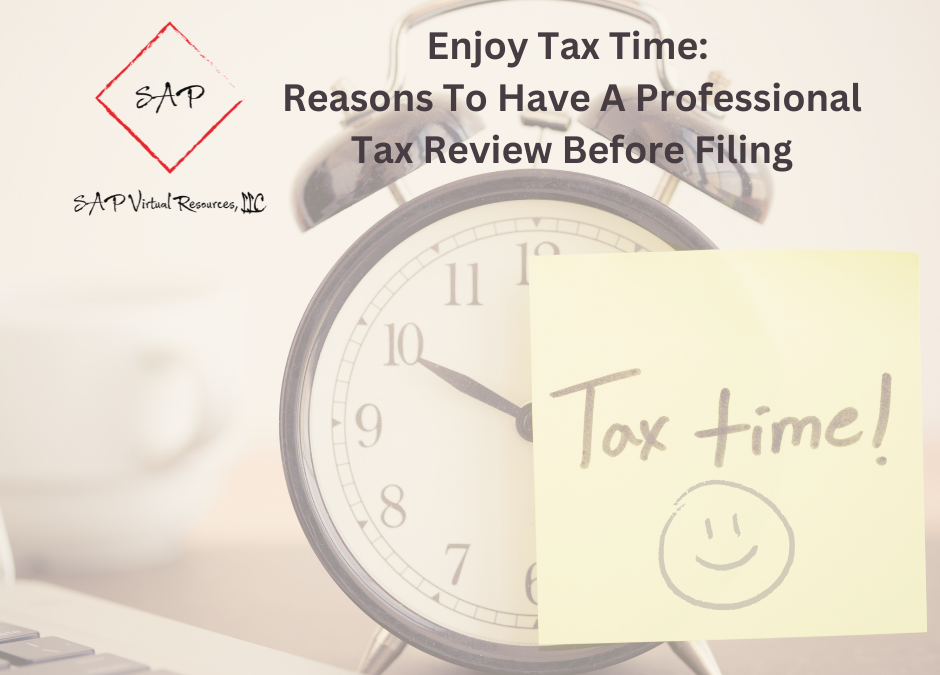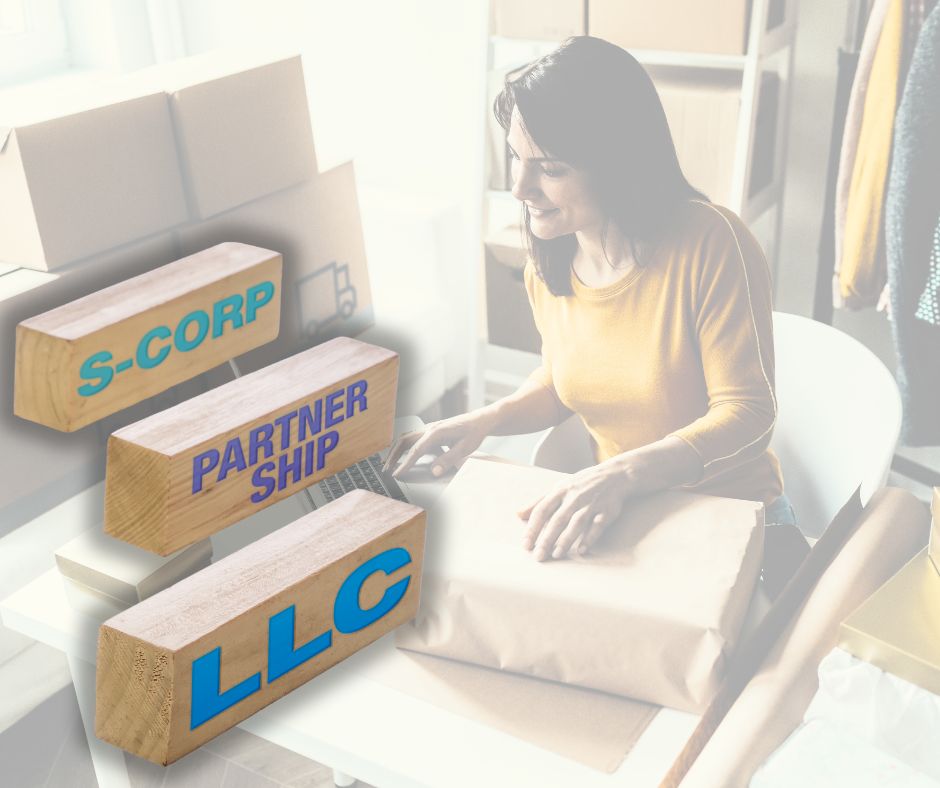
by Sarah | Jan 10, 2025 | Tax, Uncategorized
By opting for a tax review before filing your taxes this year, you can significantly reduce the anxiety that often accompanies tax time. Maybe ENJOY is a stretch, but you will feel better than you usually feel at tax time. The stress of unorganized books, juggling deadlines, and the possibility of making a costly mistake can be overwhelming, even for the most confident business owners.
As the owner of SAP Virtual Resources, LLC, I have seen how this proactive step can save time, money, and stress for busy entrepreneurs.
The Value of a Professional Review
Spot Errors Before the IRS
Even the most meticulous business owner can make bookkeeping mistakes. Common mistakes like missed deductions, miscategorized expenses, or duplicate entries may not be obvious when you are in the thick of tax preparation while continuing your daily business activities. They may not seem significant, but they can lead to larger problems.
An accountant’s trained eye can catch these and other mistakes. A tax review can ensure your financials are accurate and compliant with IRS regulations, reducing your chances of an audit or incurring penalties.
Expert Advice on Deductions and Credits
The complex and ever-changing tax laws require attention to detail. It is easy to overlook valuable deductions and credits that can apply to your business. There are several small business tax credits that you may qualify to use.
An accountant who offers a tax review stays current on the latest tax regulations to help you take advantage of all opportunities. They can help you with your current year’s taxes and help you implement new strategies for the following year.
Save Time and Reduce Stress
Get Back to Running Your Business
Once your information is ready, you can submit it for a professional tax review. This allows you to refocus on running your business, knowing that your books are in the capable hands of an expert. It’s time to do what you do best with the peace of mind that comes from professional oversight.
Prevent Costly Mistakes
Significant financial consequences can be the result of minor bookkeeping issues. A misplaced decimal point or a forgotten receipt can make a difference. Without a tax review, these issues may go unnoticed, leading to penalties and additional stress. An accountant can address many problems before they escalate, potentially saving you from these consequences.
Prepare for Growth and Audits
Insights into Business Health
A tax review helps you understand your business’s financial health. An accountant can identify business trends, cash flow issues, or areas where you can improve profitability. This information can help you make sound decisions about the future of your business.
Audit Readiness
Any business owner feels chills at the thought of an IRS audit. Being prepared for the possibility is priceless. An accountant can verify that your records are complete, accurate, and defensible, reducing the likelihood of complications if you receive an audit notification.
Tailored Advice for Your Business
Custom Tax Strategies
Your business is unique, and cookie-cutter advice doesn’t always work. After a tax review, an accountant can provide you with a tailored tax strategy based on your industry, goals, and financial position. Their expertise can help you plan retirement contributions, time purchases of business assets, or navigate unique deductions.
Invest With Confidence
A professional tax review is an investment in your business’s financial health and your peace of mind. The clear benefits include saving time, reducing stress, and a business set for future success.
Be proactive and make tax time stress-free. (You may even ENJOY it!) Contact me to discuss a tax review today.
by Sarah | Mar 19, 2024 | Uncategorized

As an LLC owner, you have several options for paying yourself, including draws and guaranteed payments. It’s crucial to understand how these methods work to ensure you’re compliant with tax laws and making the most of your hard-earned cash. In this blog post, we’ll break down the ins and outs of paying yourself as an LLC owner.
Draws
A draw is a payout of profits to LLC owners, typically taken throughout the year. Unlike a salary, draws aren’t subject to payroll taxes, but they are subject to income tax and self-employment tax.
Draws don’t count as a business expense, so they don’t lower your LLC’s taxable income. It’s also important to avoid taking excessive draws, as this can drain your business’s cash reserves and put it in a tough spot financially.

Guaranteed Payments for Partner LLC Owners
Guaranteed payments are especially relevant for LLCs with multiple owners, as they provide a way to compensate partners for their services to the company. These payments are considered a business expense, so they can be deducted from the LLC’s taxable income. Guaranteed payments are also subject to self-employment tax.
Partner LLC owners should consider the value of their services and compare it to industry standards when determining fair guaranteed payments. These payments should be reasonable and reflect the services provided by each partner to the LLC. Additionally, it’s essential to have a clear agreement in place that outlines the payment structure and how profits and losses will be shared among partners.
By understanding the role of guaranteed payments in a partner LLC, owners can ensure that everyone is compensated fairly and that the business is in compliance with tax laws.
S-Corporation Election
LLC owners can choose to be taxed as an S-corporation, which allows them to receive a salary through payroll. As an S-corporation owner, you’re considered an employee of your company, so your salary is subject to payroll taxes but not self-employment tax.
To elect S-corporation status, LLC owners must file Form 2553 with the IRS and meet specific criteria. While S-corporation election can offer tax benefits for some LLC owners, it also involves additional administrative and compliance responsibilities. It’s essential to consult with a tax professional before making this decision.
.

Takeaway
Getting paid as an LLC owner requires careful consideration of tax laws and financial implications. Draws and guaranteed payments are common methods for LLC owners to receive compensation, and S-corporation election is another option for those who qualify. By understanding the pros and cons of each method and consulting with a tax professional, LLC owners can make informed decisions that support their financial goals and ensure compliance with tax laws.
by Sarah | Mar 19, 2024 | Uncategorized

Avoiding Costly Scams When Starting Your Business: Tips for Protecting Your Wallet
Starting a new business is an exciting and challenging journey, but it’s essential to be aware of potential scams that can drain your wallet and derail your progress. Some unscrupulous individuals and companies prey on new business owners, offering “helpful” services that are unnecessary or overpriced. In this blog post, we’ll explore some common scams to avoid and provide tips for protecting your hard-earned money.
Don’t Pay for an EIN
One of the first things you’ll need to do when setting up a business is to obtain an Employer Identification Number (EIN) from the IRS. While some websites may offer to obtain an EIN for you for a fee, this is a scam. The IRS provides EINs for free, and the application process is straightforward and can be completed online in just a few minutes. Don’t pay for something you can get for free!

Beware of Phantom Corporate Setup Fees
Another common scam involves companies charging exorbitant fees to set up a corporation or LLC for you. While there are legitimate companies that offer these services, some will charge hundreds or even thousands of dollars for something you can do yourself for a fraction of the cost. Before paying for these services, research your state’s requirements for forming a business entity and consider doing it yourself or hiring a reputable attorney to help.
Avoid Fake Business Licenses and Permits
Some scammers may try to sell you fake business licenses or permits that you don’t actually need. Before paying for any licenses or permits, check with your state and local governments to determine which ones are required for your business. In most cases, you can obtain these directly from the government agency at a much lower cost than what scammers are charging.

Tips for Protecting Yourself
To avoid falling victim to business setup scams, keep these tips in mind:
- Research your state’s requirements for setting up a business entity and obtaining necessary licenses and permits.
- Be skeptical of companies that promise to expedite the process or offer services that seem too good to be true.
- Don’t pay for something you can get for free, such as an EIN.
- Read reviews and check the Better Business Bureau before hiring a company to help with business setup.
- Consider working with a reputable attorney or accountant who specializes in small business services.
Starting a business is a big undertaking, and it’s natural to feel overwhelmed or unsure at times. However, by staying informed and cautious, you can avoid falling prey to scams and focus on building a successful and thriving business. Remember, if something seems too good to be true, it probably is. Trust your instincts and do your research before handing over your hard-earned money.
by Sarah | Mar 19, 2024 | Uncategorized

Why You Shouldn’t Mix Business and Personal Finances
As a small business owner, you might be tempted to use your personal bank account for business expenses or to make personal purchases with your business credit card. However, mixing your business and personal finances can cause significant problems that could cost you time, money, and even your limited liability status. In this blog post, we’ll explore a few of the reasons why it’s crucial to keep your business and personal finances separate.
Lost Expense Deductions
One of the biggest advantages of having a small business is the ability to deduct business-related expenses from your taxable income. However, if you’re using your personal bank account for business expenses, it can be challenging to prove which expenses were exclusively for business purposes. As a result, you could miss out on valuable tax deductions, costing you more money in taxes.

Commingling Funds Can Pierce the Corporate Veil
If you own a limited liability company (LLC) or corporation, you likely chose that business structure to protect your personal assets from business liabilities. However, if you’re using your personal bank account for business expenses or making personal purchases with your business credit card, you could be inadvertently blurring the line between your business and personal finances. In legal terms, this is known as “commingling funds,” and it can put your personal assets at risk by piercing the corporate veil.
If your business is ever sued or can’t pay its debts, a court could determine that your LLC or corporation is just an extension of your personal finances, and therefore, your personal assets are fair game for creditors.
Difficulty Tracking Business Performance
Another reason to keep your business and personal finances separate is that it makes tracking your business performance much more difficult. If your business and personal expenses are all mixed together, it’s hard to determine how much revenue your business is generating and whether it’s profitable. By keeping your finances separate, you’ll have a clearer picture of your business’s financial health, making it easier to make informed decisions and plan for the future.

Tips for Keeping Business and Personal Finances Separate
If you’ve been mixing your business and personal finances, now is the time to make a change. Here are a few tips to help you keep your finances separate:
- Open a business bank account and use it exclusively for business transactions.
- Apply for a business credit card and use it only for business expenses.
- Use accounting software to track your business income and expenses separately from your personal finances.
- Set up a separate business entity, such as an LLC or corporation, to further separate your business and personal finances.
Keeping your business and personal finances separate might seem like a hassle at first, but it’s essential to protect your assets and take advantage of tax benefits.
by Sarah | Mar 19, 2024 | Uncategorized

Stacy’s Success Story: Streamlining Finances for a Booming Catering Business
Stacy, the proud owner of a startup catering business, faced challenges in organizing her finances. With business transactions scattered across personal and business accounts and multiple payment methods, it became difficult for her to keep track of everything effectively. Stacy sought our assistance to achieve a clearer, more efficient financial management system.
Challenges Faced
Stacy’s finances were disorganized due to:
- Mixing personal and business funds, making it challenging to differentiate between them.
- Incomplete tracking of expenses in QuickBooks, leading to potential inaccuracies in financial reports.
- Use of multiple credit cards and payment methods, causing difficulties in tracking expenses and income as well as maintaining records.

The Solution
Our team began by identifying the key areas in need of improvement, then devised a plan tailored to Stacy’s catering business. Here’s how we streamlined her financial management:
- Separating Personal and Business Finances: We helped Stacy set up separate bank accounts and credit cards exclusively for her catering business, ensuring a clear separation of finances. This made tracking business expenses and income more manageable and efficient.
- Expense Tracking and Documentation: We assisted Stacy in recording all personal funds invested into her business, along with any personal loans. This included ensuring all expenses were correctly categorized and documented, contributing to a more accurate financial picture.
- Mileage and Gas Purchases: We worked with Stacy to document and categorize her mileage and gas purchases to determine whether it made better sense to take the mileage deduction or actual costs deduction for her business and making sure they were accurately represented in her financial records.
- Financial Reporting: By organizing Stacy’s finances, we were able to generate reliable financial reports that provided valuable insights into her business’s performance. These reports could then be used for filing taxes and making informed decisions.

Impact
With a more streamlined approach to managing her business finances, Stacy now enjoys:
Accurate and efficient tracking of expenses, allowing her to make better-informed financial decisions.
Time-saving processes due to the separation of personal and business finances.
Reduced stress and improved focus on her core business operations.
Through our tailored financial management solutions, Stacy’s catering business is now better equipped to handle its finances and focus on what matters most: delivering exceptional catering services to its clients.
Interested in how we can help your business through tailored financial management solutions?
Book a free consultation now.
Book Now

by Sarah | Mar 7, 2021 | Business Tools, Uncategorized
Why is Audit such a bad word that gives people nightmares? I know that most people flinch when they hear the term audit because they automatically think of the IRS or other government agencies but it doesn’t have to be a bad word. Audits are really just in-depth reviews of certain things, usually your expense accounts. You can find out important information if you really look into your accounts.
Accounts that need minimal review
What accounts should you review? Really, all of your accounts should be reviewed on a regular basis. Some could use more insight than others. For example, your utility bills rarely change but during certain times of the years, is your electric or gas usage getting too high or has your internet and phone package been inching up? Your utilities only need a review yearly or seasonally and do not need to be reviewed too closely each month but other accounts may need to be reviewed much more often.
Other Accounts need frequent review
Do you sit down and review your job materials and labor or your vehicle maintenance on a monthly or semi-monthly basis? These can change drastically depending on how busy your business is. Did these accounts go up when you were busy and not come down when your business slowed down? Did some processes quit working for you and are costing you more money now? Have the job costs gone up but your pricing hasn’t? Are your vehicle costs inching up or the gas usage getting worse?
How to use the reviewed information
A great way to make sure that you know exactly where your profits are going is to review the costs on a regular basis. Make sure that all non-used project items are returned and that the credits are actually received. Look to see if your vehicles are not starting to cost more to maintain than they are worth. Other accounts to watch carefully are shipping and freight, can you combine orders throughout the day to meet the minimum amount for free shipping or will a vendor offer discounts or free shipping if you order more of your regular purchases through them?
If you do not know exactly where your money is going, you do not know how you can cut costs or if you need to raise your rates. You won’t know the best way to invest better in your company if you don’t know what isn’t working anymore. Please set up a call with me here if you need help to audit your expense accounts.














